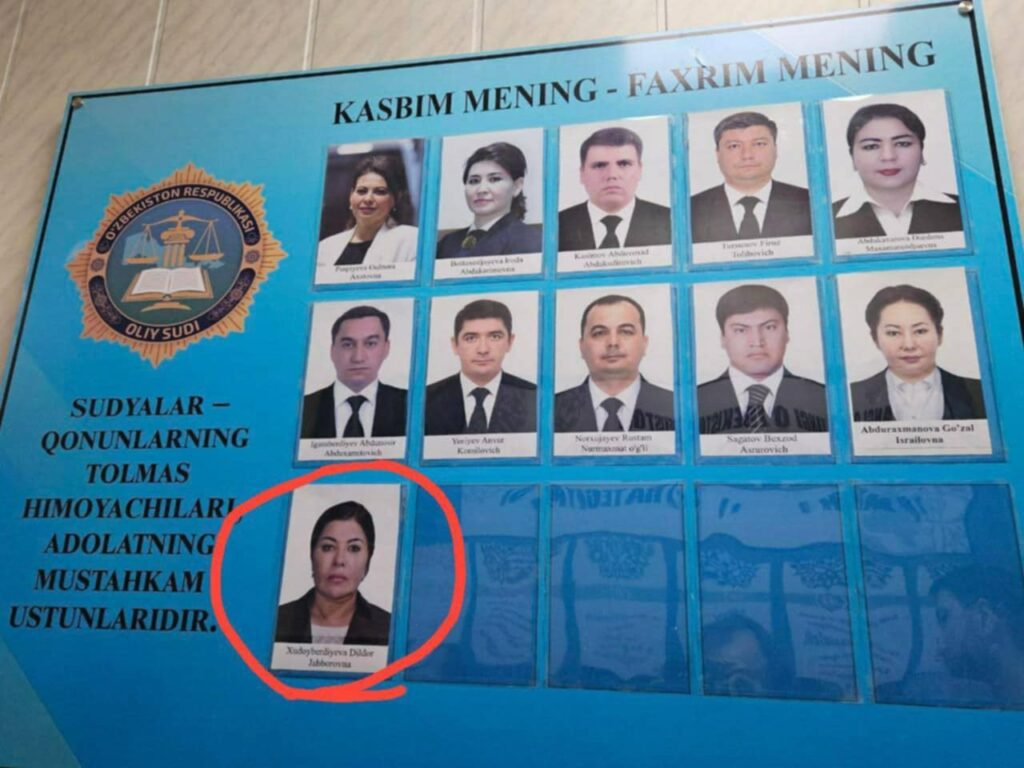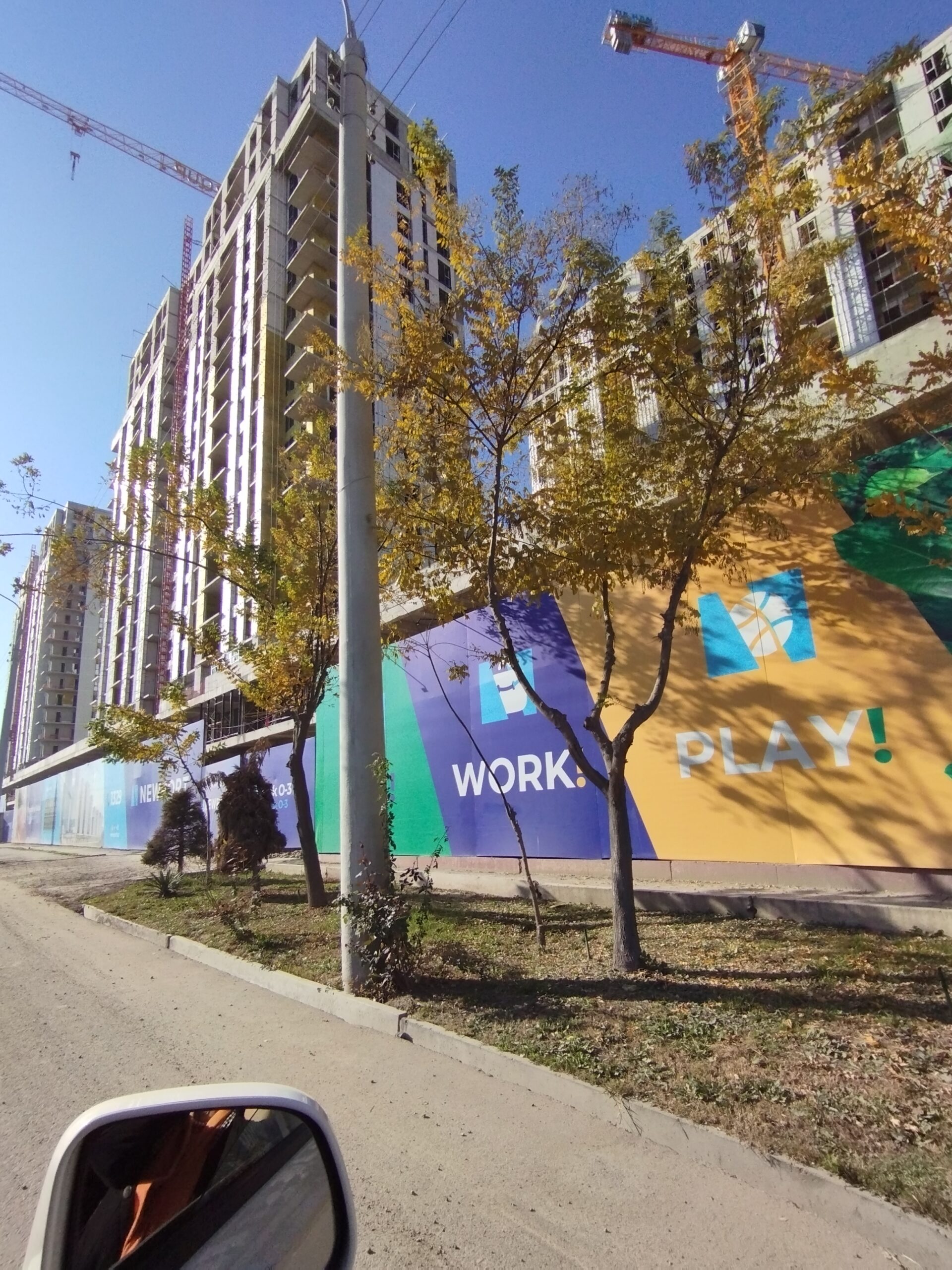Yakkasaray court evicts residents of Damaryk according to ineffective legal acts, ignoring existing laws
20.12.2024
We have four decisions of the Court on Civil Cases of Yakkasaray district (Tashkent) of 2024, depriving citizens of their right of private ownership of their houses at the request of a private commercial developer. Our attention was drawn to the motivation part of the decisions issued by two different judges, but written as if they were copy-pasted. Both judges motivated their decision by a stillborn by-law: Resolution of the Cabinet of the Ministers (RCM) of Uzbekistan #911 dated 18.11.2019, whose Regulation “On the procedure for issuing compensation for the seizure of land plots and real estate objects” was canceled in February 2023 by the Cabinet of the Ministers it-self. At the same time, the provisions of the current legislation of the Republic of Uzbekistan were ignored.
Background
In 2019, Mega Logistic Service LLC received a permit for construction of residential multi-storey apartment buildings on an area of 6.8 hectares at the intersection of MKAD and A.Kakhkhor streets, in the ancient Damaryk mahalla (neighborhood).
Mega Logistic Service was authorized by the decision of Tashkent’s Khokim (Mayor) J.Artykhodjaev #128 dated 06.02.2019 to resettle the people living there, approximately 160 houses, in accordance with the then effective Resolution of the Cabinet of the Ministers of Uzbekistan (RCM) #97 of 29.05.2006.
The following information about Mega Logistic Service LLC can be found on the website orginfo.uz :
Founders: foreign citizen WANG RUOYU (31.50%), ONE HOUSE, 53.30% (one of the owners of which is the same WANG RUOYU), and Turkish company MILESTONE INSHAAT SANAYI VE TIJARET LIMITED SHIRKETI (or in other spelling MILESTONE INSAAT SANAYI VE TICARET) 15.20%.
Residents were against the decision #128

Last days of the ancient neighborhood Damaryk mahalla
Residents of the mahalla did not agree with this decision #128 and filed a petition to the inter-district Uchtepa Administrative Court (Tashkent) in 2020. Administrative case # 3-1006-1903 / 4477 was considered by Judge J.Kurbanov. The residents asked to invalidate the decision of the Khokim of Tashkent # 128 of February 6, 2019, and the decision of the Khokim of Yakkasaray district (Tashkent) #166 of February 8, 2019, that was made in fulfilment of the Tashkent city’s Mayor resolution.
Uchtepa Inter-District Administrative Court by its decision dated September 22, 2020, refused to satisfy the application of the residents on the most primitive grounds: the lapse of three-month term during which it is possible to challenge the decision of the state body. Subsequent instances supported their colleagues from the Uchtepa Court.
Residents note that the judge ignored violations of the Law when issuing the above-mentioned decisions. At the time of their issuance, in 2018, there were many Resolutions of the Cabinet of Ministers of Uzbekistan (RCM), Resolutions and Decrees of the President of Uzbekistan (RP and DP) on the topic of issuance of land plots, not to mention the Laws and Codes of the President of the Republics of Uzbekistan. It is not difficult to get confused in the abundance of the by-laws and laws, which was used by the developer and the Tashkent administration entrusted to the developer, as well as judges.
You can see for yourselves.
-
Illegal allocation of land
In accordance with paragraph 1 of the RCM #493 dated 30.06.2018. “On measures to introduce modern and transparent mechanisms for granting land plots for permanent use for entrepreneurial and urban planning activities” and paragraph 1 of the Resolutionof the President of Uzbekistan dated 20.04.2018 # RP-3677 ‘On measures to radically improve the procedure for granting land plots for permanent use for entrepreneurial and urban planning activities’ , the procedure has been established, according to which legal entities and individuals are granted land plots by means of electronic auction through a single electronic trading platform “E-IJRO AUKSION” ( Dou you see two by-laws at once? Let’s mark them as by-laws # 1 and # 2).
This requirement was not complied with, and as explained at the court session by the representative of the Tashkent Khokimiyat (Administration), the land plot was allocated on the basis of the concluded investment agreement in accordance with the procedure stipulated by the decree of the President DP-5511 dated 15.08.2018 “On measures to implement an experiment to improve the investment climate in the city of Tashkent”, which has a reference to the presidential decree DP-5495 of 01.08.2018 “On measures to radically improve the investment climate in the Republic of Uzbekistan” (by-laws #3 and #4).
However, both by-laws #3 and #4 state that “decision-making on the withdrawal of land plots for state and public needs is allowed only after an open discussion with interested parties, whose land plots are planned to be withdrawn, as well as an assessment of benefits and costs”
It should be noted that the construction of residential apartment buildings and any commercial premises by private developers is not included in the list of state and public needs.
In accordance with paragraph 5 of the Resolution of the Cabinet of Ministers (RCM) #63 dated 28.01.2019 “On additional measures on introduction of modern and transparent mechanisms of land plots allocation and realization of the right to lifetime inheritable possession of land plots for individual housing construction”, « Allocation of land plot for state and public needs, which is in possession, use, lease or ownership of legal entities or individuals, is made only after withdrawal (redemption) of this land plot from them in the established order (by-law #5).
The judge also ignored the fact that DP-5511 provides for the procedure of experimentation exclusively for the sales of state property objects, with the mandatory publication of relevant information on the website of the Tashkent khokimiyat (which we have never seen).
However, there are 140 residential dwellings on the land plot transferred to the developer, accordingly, this land plot could not be recognized as unused. And information about “investor days” and decisions made on it was not published anywhere, which was required by the same DP-5511.
We see that the court juggles with all kinds of by-laws, choosing from them those parts of the text that suit the developer.
-
Absence of the Master Plan
Residents also tried to draw the judge’s attention to the fact that the decision of the Khokim was made in the absence of the Master Plan of Tashkent city, but in vain. The judge was indifferent to the violation of the provisions of Article 34 of the Urbanism Code of Uzbekistan, which prohibits the construction on the territory of settlements without a master plan. The absence of an approved General Plan of the city is also mentioned in DP-5515 of 17.08.2018 “On additional measures to introduce modern and transparent mechanisms for the provision of land plots and realization of the right to lifetime inheritable ownership of land plots for individual housing construction” : « the lack of an approved master plan of the city of Tashkent leads to disorderly construction » (By-law #6).
-
Lack of open discussion and expertise
At the trial, the representative of the Khokimiyat stated that no open discussion was held, and therefore no information was provided about the open discussion with interested parties whose land plots are planned to be withdrawn, as well as the assessment of benefits and costs. Here we see a direct violation of para 28 of RCM # 63, which states: «The decision on allotment of a land plot shall reflect the following issues: the amount of losses to be compensated to owners, possessors, users and lessees of land plots, and the terms of their compensation».
The Court even ignored the violation of Articles 10 and 24 of the Law of the Republic of Uzbekistan “On Local State Power”, according to which the subsequent approval of the adopted decisions by the relevant Council of people’s deputies is envisaged. In accordance with Article 21 of the Law #342 dated 24.12.2012. “On normative-legal acts”, «the draft normative-legal act is subject to mandatory legal expertise”.
However, the defendants (khokimiyat + developer) believe that the expert examination with the justice authorities is not mandatory (!!!). And the Court ignored the provisions of paragraph 4 of the Presidential Decree DP-3666 “On organizational measures for further improvement of the Ministry of Justice of the Republic of Uzbekistan” dated 13.04.2018, according to which «a mandatory condition for the adoption of normative legal acts by local authorities is the positive validation of the territorial bodies of Justice on the results of legal expertise».
-
Missing the deadline for appeal
The Court in its decision refers to the fact that the Applicants (residents) missed the deadline for appeal without valid reasons, referring to Article 186 of the Code of the Administrative Liability: “Unless this Code or other laws establish other terms, an application (complaint) against a decision, actions (inaction) of an administrative body … may be filed with the court within three months from the moment when the interested person became aware of the violation of his rights, freedoms and legitimate interests”.
However, in accordance with Article 163 of the Civil Code, the limitation period does not apply to claims of the owner or other owner to eliminate his right, although these violations were not related to the deprivation of possession.
Court trials for eviction
In 2021, the developer began the process of resettlement of residents, some of them agreed, some were evicted through the courts. By the fall of 2024, 12 houses remained on the site. The developer sued for eviction of the residents of these houses and won everywhere.
We have four decisions, issued by the court on civil cases of Yakkasaray district (Tashkent) in 2024, stating to deprive citizens of their private property rights to their houses at the request of a private commercial developer. Due to confidentiality, we will not disclose the personal data of the residents whose house is being taken away. We are more interested in what judges are guided by when making such decisions.
Three decisions – #2-1005-2405/24719 of 21.11.2024, #2-1005-2405/24717 of 27.11.2024 and #2-1005-2405/24716 of 26.10.2024 – were issued by Judge Z.L. Solieva, the fourth case – #2-1005-2403/14909 – was considered by another judge, Sh.B. Zhamolov, the decision was issued on 28.10.2024. Nevertheless, the statements of reasons of all decisions are written as if they were copy-pasted. This may be due to the fact that one of the lawyers of the developer is Khudojberdiyeva D., the former judge of the same Yakkasar Civil Court.

This poster was hanging in the lobby of Yakkasaray Civil Court back in early 2024, when eviction trials started. Red circle marks former judge Khudojberdiyeva, now a lawyer for the developer
In all cases, Mega Logistic Service LLC filed a petition asking to deprive the owners of their title to their private house, to determine compensation for the house and to evict all people registered in these houses.
All four plots have roughly the same area of 600 to 700 square meters, on which houses of 200 to 300 square meters stand. The evicted residents do not agree to the amount offered to them by the developer. According to the Law on the Protection of Private Property, the owner has the right to dispose of his property as he sees fit. The developer has no legal claim to the residents’ houses, as the Khokim’s decision does not identify the developer as the owner of these houses.
Since the Mega Logistic Service construction project was not discussed with the residents, and the residents are not a party to the investment agreement between the developer and the Khokimiyat, neither this project nor this investment agreement imposes any obligations on the residents.
Why, then, does the developer demand that the court deprive the legal owner of the house of his property rights?
Stating that the court protects the Constitutional rights of citizens, the judges refer to Article 206 of the Civil Code of the Republic of Uzbekistan to justify the deprivation of property rights. However, this article only describes the conditions under which “termination of the right of ownership in connection with the decision of the state body, not directly aimed at taking property from the owner” is allowed. Moreover, according to the text of the same article, it is “allowed only in cases and in accordance with the procedure established by Law, with provision to the owner of equivalent property on the right of ownership and compensation of other losses incurred, caused by the termination of the right of ownership”.
Since none of the Laws of Uzbekistan provides for deprivation of the right of private ownership of housing at the request of a private developer, the judges are trying to give the appearance of legality of this action by the fact that the decision of the khokim itself is a legal act by virtue of the provisions of the Law of Uzbekistan #ZRU-682, dated 20.04.2021, “On normative-legal acts”, which indeed attributes the decisions of the khokim to the legal acts.
As we wrote above, the residents of the mahalla tried to appeal against this decision #128 but lost for the most primitive reason: the omission of the 3-month term. And since this decision of the khokim was upheld, the judges consider it to be a legal act.
However, the judges clearly ignore the provisions of other articles of this law, which give the decisions of state bodies the status of normative-legal act, namely:
Article 3: The concept of a normative-legal act
A normative-legal act is an official document adopted in accordance with the legislation, aimed at establishing, amending or abolishing legal norms as generally binding state regulations.
What, I wonder, legal norms are canceled by the decision of Khokim # 128?
Article 16. Decisions of local bodies of state power
Decisions of local bodies of state power are adopted on the basis of and in pursuance of the Constitution and laws of the Republic of Uzbekistan, resolutions of the chambers of the Oliy Majlis (parliament) of the Republic of Uzbekistan, decrees, resolutions and orders of the President of the Republic of Uzbekistan, resolutions and orders of the Cabinet of Ministers of the Republic of Uzbekistan, as well as decisions of higher bodies of state power in the field.
The Khokim’s Decision # 128 refers to a certain protocol of the Cabinet of Ministers, but in no way to decisions or resolutions of the Cabinet of Ministers or the President.
In making Decision #128, the following provisions f the Law on Normative-Legal Acts were also not enforced:
Article 24. Public discussion of draft normative-legal acts
Drafts of the normative-legal acts shall be placed by the their initiators on the portal of discussion of normative-legal act drafts for public discussion in the manner prescribed by law.
Article 25: Examination of a draft normative-legal act
A draft normative-legal act shall be subject to mandatory legal and anti-corruption expertise.
Article 37. State registration of normative-legal acts of ministries and departments
Ministries and departments within ten days from the date of adoption of normative-legal acts shall submit them to the Ministry of Justice of the Republic of Uzbekistan for state registration.
Normative-legal acts of ministries and departments that have not undergone state registration may not serve as a basis for legal regulation of relevant public relations and shall not entail legal consequences.
Article 38: Requirements for the publication of normative-legal acts
Normative legal acts shall be published in official publications. No one may be convicted, penalized, deprived of property or any rights on the basis of a law that has not been officially published.
Then the both judges write in their above-mentioned court decisions that on the basis of the order of the President of the Republic of Uzbekistan, dated 03.08.2019 #R-5491 “On additional measures to unconditionally guarantee the right of ownership of citizens and business entities” and adopted in its execution the RCM # 911 dated 16.11.2019 “On additional measures to guarantee the property rights of individuals and legal entities and improve the procedure for withdrawal of land plots and provision of compensation”, the Regulation “On the provision of compensation to the owners of land plots” was adopted.
Then the judges quoted the Regulation, which expired on February 23, 2023, and the RCM #911 itself was cut down to provisions on the creation of compensation commissions ( https://housing-uz.info/ru/1269/).
Nonchalantly, the judges quote the paragraphs of this stillborn RCM, but again, not all of them, but only those that are favorable to the developer:
«para 21. In case of owners’ refusal to realize investment projects aimed at development of the territory and improvement of architectural appearance, the initiator draws up a statement of disputes and signs it jointly with the owner. In case of refusal to sign the statement of disputes, a document stating the reasons for refusal shall be drawn up. After signing the statement of disputes (act), the Council of Ministers of the Republic of Karakalpakstan, the khokims of Tashkent city, region or district (city) have the right to apply to the court to impose obligations. »
However, no protocol of disagreement, no acts from the Khokimiyat appear in these judicial cases.
The scandalously famous paragraph 47 of this Regulation, which establishes a threshold of 75% of consenting owners to evict the remaining 25%, is also used as evidence of the legality of the developer’s claims. Let us recall that even the Constitutional Court in 2021 doubted the constitutionality of this paragraph ( https://housing-uz.info/ru/689/).
And so, based on these clauses of the defunct Regulation, the developer files an application with the court, and the judge accepts it!
It is noteworthy that the judges do not even mention the Law #781 of 29.06.2022 “On the procedures of withdrawal of land plots for public needs with compensation”, which is in force in this area ! Although this law clearly indicates that all decisions related to the withdrawal of land plots should be decided in accordance with its provisions!
Article 39. Regulation of relations initiated but not finalized prior to the entry into force of the present Law
If prior to the entry into force of the present Law procedures for the withdrawal of land plots were initiated, but a decision on the withdrawal of a land plot in accordance with the procedure envisaged by part one of article 37 of the Land Code of the Republic of Uzbekistan was not adopted, then the procedures envisaged by the present Law shall be applied in respect of these land plots.
If before the entry into force of this Law a decision on the withdrawal of a land plot has been made in accordance with the procedure envisaged by part one of article 37 of the Land Code of the Republic of Uzbekistan, the procedures envisaged by articles 22-32 of this Law shall be applied in respect of these land plots when resolving issues related to the conclusion of an agreement, provision of compensation, assessment of immovable property subject to demolition and rights to the withdrawn land plot, demolition of immovable property.
Further as on the beaten track, as well as all previous years, the judge cited Article 27 of the Housing Code that stated «Provision with residential premises of citizens, whose houses (apartments) are subject to demolition in connection with the withdrawal of plots for state or public needs » .
Article 70 of the Housing Code is also not forgotten “Eviction from residential premises”
And the judges write in his decision “Eviction from the occupied residential premises in the houses of municipal housing stock is allowed on the grounds established by this Code. Eviction is carried out in a judicial order”.
But all the “defendants” owners of the house is not municipal or departmental, they belong to them on the right of private ownership!
And here on the basis of such clearly inadequate, i.e. not corresponding to the provisions of the law, the judge makes a decision on deprivation of the right of private property.
by Farida Sharifullina

